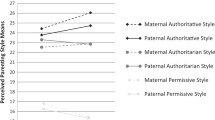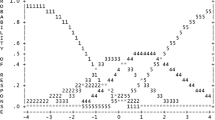Abstract
Although intensive parenting is considered a dominant ideology of child-rearing, the tenets have only recently been operationalized. The Intensive Parenting Attitudes Questionnaire (IPAQ) was designed to assess the prescriptive norms of how people should parent and includes scales assessing the ideas that parenting is fulfilling, but challenging, and should be child-centered, involve intellectual stimulation, and is best done by women. The original IPAQ refers to parents, rather than mothers or fathers specifically, and was developed and validated on both women who were and were not mothers. The current investigation was designed to determine (a) whether women hold stronger intensive parenting beliefs than men and (b) whether answers on the IPAQ would vary depending on whether the referent was a mother, a father, or a parent. Participants included 322 male and female college students who were randomly assigned to receive one of three versions of the IPAQ referring either to mother, father, or parent. A main effect for sex indicated that female students held more intensive parenting beliefs than male students. A main effect for version indicated that referring to fathers led to more intensive attitudes than referring to mothers on the Child-Centered and Fulfillment scales, but parenting was rated as more Challenging than fathering. Whether the emphasis on father involvement found in the present investigation will translate into actual paternal involvement once participants have children is discussed.
Similar content being viewed by others
References
Alberts, J. K., Tracy, S. J., & Trethewey, A. (2011). An integrative theory of the division of domestic labor: Threshold level, social organizing and sensemaking. Journal of Family Communication, 11, 21–38. doi:10.1080/15267431.2011.534334.
Allen, S. M., & Hawkins, A. J. (1999). Maternal gatekeeping: Mothers’ beliefs and behaviors that inhibit greater father involvement in family work. Journal of Marriage and the Family, 61, 199–212. doi:10.2307/353894.
American Psychological Association. (2001). Publication manual of the American Psychological Association (5th ed.). Washington, DC: American Psychological Association.
Arendell, T. (2000). Conceiving and investigating motherhood: The decade’s scholarship. Journal of Marriage and the Family, 62, 1192–1207. doi:10.1111/j.1741-3737.2000.01192.x.
Askari, S. F., Liss, M., Erchull, M. J., Staebell, S. E., & Axelson, S. J. (2010). Men want equality, but women don’t expect it: Young adults’ expectations for participation in household and child care chores. Psychology of Women Quarterly, 34, 243–252. doi:10.1111/j.1471-6402.2010.01565.x.
Blair-Loy, M. (2003). Competing devotions. Cambridge, MA: Harvard University Press.
Bradley, R. H. (1998). In defense of parental investment. Journal of Marriage and Family, 60, 791–795. doi:10.2307/353547.
Bradley, R. H., Whiteside-Mansell, L., Brisby, J. A., & Caldwell, B. M. (1997). Parents’ socioemotional investment in children. Journal of Marriage and Family, 59, 77–90. doi:10.1177/0891243211417433.
Cassano, M., Adrian, M., Veits, G., & Zeman, J. (2006). The inclusion of fathers in the empirical investigation of child psychopathology: An update. Journal of Clinical Child and Adolescent Psychology, 35, 583–589. doi:10.1207/s15374424jccp3504_10.
Chesley, N. (2011). Stay-at-home fathers and breadwinning mothers: Gender, couple dynamics, and social change. Gender & Society, 25, 642–664. doi:10.1177/0891243211417433.
Choi, P., Henshaw, C., Baker, S., & Tree, J. (2005). Supermum, superwife, supereverything: Performing femininity in the transition to motherhood. Journal of Reproductive and Infant Psychology, 23, 167–180. doi:10.1080/02646830500129487.
Cohen, J., Cohen, P., West, S. G., & Aiken, L. S. (2003). Applied multiple regression/correlation analysis for the behavioral sciences (3rd ed.). Mahwah, NJ: Lawrence Erlbaum Associates.
Coltrane, S. (2000). Research on household labor: Modeling and measuring the social embeddedness of routine family work. Journal of Marriage and the Family, 62, 1208–1233. doi:10.1111/j.1741-3737.2000.01208.x.
Cowan, C., & Cowan, P. (1988). Who does what when partners become parents: Implications for men, women, and marriage. Marriage and Family Review, 12, 105–131.
Dew, J., & Wilcox, W. B. (2011). If momma ain’t happy: Explaining declines in marital satisfaction among new mothers. Journal of Marriage and Family, 73, 1–12.
Dillaway, H., & Paré, E. (2008). Locating mothers: How cultural debates about stay-at-home versus working mothers define women and home. Journal of Family Issues, 29, 437–464. doi:10.1177/0192513X07310309.
Fagan, J., & Barnett, M. (2003). The relationship between maternal gatekeeping, paternal competence, mothers’ attitudes about the father role, and father involvement. Journal of Family Issues, 24(8), 1020–1043. doi:10.1177/0192513X03256397.
Fetterolf, J. C., & Eagly, A. H. (2011). Do young women expect gender equality in their future lives? An answer from a possible selves experiment. Sex Roles, 65, 83–93. doi:10.1007/s11199-011-9981-9.
Friedman, M. (2008). “Everything you need to know about your baby”. Feminism and attachment parenting. In J. Nathanson & L. C. Tuley (Eds.), Mother knows best: Talking back to the “Experts”. Toronto, ON: Demeter Press.
Gaunt, R. (2008). Maternal gatekeeping: Antecedents and consequences. Journal of Family Issues, 29, 373–395. doi:10.1177/0192513X070307851.
Guendouzi, J. (2005). “The guilt thing”: Balancing domestic and professional roles. Journal of Marriage and Family, 68, 901–909. doi:10.1111/j.1741-3737.2006.00303.x.
Hays, S. (1996). The cultural contradictions of motherhood. New Haven, CT: Yale University Press.
Hays, S. (1998). The fallacious assumptions and unrealistic prescriptions of attachment theory: A comment on “parents’ socioemotional investment in children”. Journal of Marriage and Family, 60, 782–790. doi:10.2307/353546.
Hochschild, A. R., & Machung, A. (1989). The second shift. New York: Avon Books.
Johnston, C., & Mash, E. (1989). A measure of parenting satisfaction and efficacy. Journal of Clinical Child Psychology, 18, 167–175. doi:10.1207/s15374424jccp1802_8.
Johnston, D. D., & Swanson, D. H. (2003). Undermining mothers: A content analysis of the representation of mothers in magazines. Mass Communication & Society, 6, 243–265. doi:10.1207/S15327825MCS0603_2.
Johnston, D., & Swanson, D. (2006). Constructing the “good mother”: The experience of mothering ideologies by work status. Sex Roles, 54, 509–519. doi:10.1007/s11199-006-9021-3.
Katz-Wise, S. L., Priess, H. A., & Hyde, J. S. (2010). Gender-role attitudes and behavior across the transition to parenthood. Developmental Psychology, 46, 18–28.
Liss, M., Schiffrin, H. H., Mackintosh, V. H., Miles-McLean, H., & Erchull, M. J. (2012). Development and validation of a quantitative measure of intensive parenting attitudes. Journal of Child and Family Studies. doi: 10.1007/s10826-012-9616-y.
Phares, V., & Compas, B. E. (1992). The role of fathers in child and adolescent psychopathology: Make room for Daddy. Psychological Bulletin, 111, 387–412. doi:10.1037/0033-2909.111.3.387.
Rizzo, K. M., Schiffrin, H. H., & Liss, M. (2012). Insight into the Parenthood Paradox: Mental health outcomes of intensive mothering. The Journal of Child and Family Studies,. doi:10.1007/s10826-012-9615-z.
Schroeder, K. A., Blood, L. L., & Maluso, D. (1993). Gender differences and similarities between male and female undergraduate students regarding expectations for career and family roles. College Student Journal, 27, 237–249.
Shows, C., & Gerstel, N. (2009). Fathering, class, and gender: A comparison of physicians and emergency medical technicians. Gender & Society, 23, 161–187. doi:10.1177/0891243209333872.
Stone, L., & McKee, N. P. (2000). Gendered futures: Student visions of career and family on a college campus. Anthropology & Education Quarterly, 31, 67–89. doi:10.1525/aeq.2000.31.1.67.
Tummala-Narra, P. (2009). Contemporary impingements on mothering. The American Journal of Psychoanalysis, 69, 4–21. doi:10.1057/ajp.2008.37.
Twenge, J. M., Campbell, W. K., & Foster, C. A. (2003). Parenthood and marital satisfaction: A meta-analytic review. Journal of Marriage and Family, 65, 574–583.
Wall, G. (2010). Mothers’ experiences with intensive parenting and brain development discourse. Women’s Studies International Forum, 33, 253–263. doi:10.1016/j.wsif.2010.02.019.
Wall, G., & Arnold, S. (2007). How involved is fathering? An exploration of the contemporary culture of fatherhood. Gender & Society, 21, 508–527. doi:10.1177/0891243207304973.
Zhou, L. (2006). American and Chinese college students’ anticipations of their postgraduate education, career, and future family roles. Sex Roles, 55, 95–110. doi:10.1007/s11199-006-9063-6.
Zuckerman, M., Hodgins, H. S., Zuckerman, A., & Rosenthal, R. (1993). Contemporary issues in the analysis of data: A survey of 551 psychologists. Psychological Science, 4, 49–53. doi:10.1111/j.1467-9280.1993.tb00556.x.
Author information
Authors and Affiliations
Corresponding author
Rights and permissions
About this article
Cite this article
Schiffrin, H.H., Liss, M., Geary, K. et al. Mother, Father, or Parent? College Students’ Intensive Parenting Attitudes Differ by Referent. J Child Fam Stud 23, 1073–1080 (2014). https://doi.org/10.1007/s10826-013-9764-8
Published:
Issue Date:
DOI: https://doi.org/10.1007/s10826-013-9764-8




